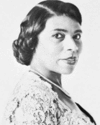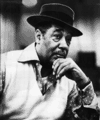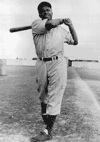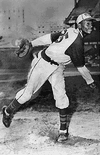
Timeline:
1936-59: The Birth of the Civil Rights Movement
| 1936 Track-and-field athlete Jesse Owens wins four gold medals in the 1936 Olympic Games in Berlin. His victories derail Adolf Hitler's intended use of the games as a show of Aryan supremacy. | ||
| c. 1936 Delta blues musician Robert Johnson makes his legendary and influential recordings in Texas, including "Me and the Devil Blues," "Hellhound on My Trail," and "Love in Vain." | ||
| 1937 Writer and folklorist Zora Neale Hurston publishes her second novel, Their Eyes Were Watching God, which receives considerable acclaim and criticism within the black community. | ||
| 1938 In a knockout in the first round of their rematch, heavyweight champion Joe Louis wreaks vengeance on Max Schmeling of Germany, the only boxer to have knocked out Louis in his prime. | ||
| c. 1938 Assisted by saxophonist Lester Young, her romantic companion during these years, jazz vocalist Billie Holiday makes several of her finest recordings. | ||
| c. 1939 Count Basie leads his legendary Kansas City band, including saxophonist Lester Young, trumpeter Buck Clayton, guitarist Freddie Green, bassist Walter Page, and drummer Jo Jones. | ||
 | 1939 Singer Marian Anderson performs at the Lincoln Memorial before an audience of 75,000 after the Daughters of the American Revolution refused to allow her to sing at Constitution Hall. | |
| 1939 The NAACP Legal Defense and Education Fund is organized. Charles Hamilton Houston spearheads the effort to consolidate some of the nation's best legal talents in the fight against legally sanctioned bias. | ||
| 1940 Author Richard Wright publishes his masterpiece, Native Son. The stark, tragic realism of this novel immediately places Wright in the front ranks of contemporary American writers. | ||
| 1940 Benjamin Oliver Davis, Sr., who in 1930 had become the first black colonel in the U.S. Army, becomes the first black general in 1940. | ||
| c. 1940 Painter Jacob Lawrence begins work on his 60-panel "Migration" series, which depicts the journey of African Americans from the South to the urban North. | ||
 | c. 1940 Duke Ellington leads his greatest band, including bassist Jimmy Blanton, saxophonist Ben Webster, trumpeter Cootie Williams, and composer-arranger Billy Strayhorn. | |
| 1941 Bayard Rustin, later the chief organizer of the 1963 March on Washington, organizes the New York branch of the Congress on Racial Equality. | ||
| 1941 Following considerable protest, the War Department forms the all-black 99th Pursuit Squadron of the U.S. Army Air Corps, later known as the Tuskegee Airmen, commanded by Benjamin Oliver Davis, Jr. | ||
| 1942 Charles Richard Drew, developer and director of blood plasma programs during World War II, resigns as the armed forces begin to accept the blood of blacks but resolve to racially segregate the supply. | ||
| 1942 The interracial Congress of Racial Equality (CORE) is founded in New York City. Its direct-action tactics achieve national prominence during the Freedom Rides of 1961. | ||
| c. 1942 Bebop is born out of the musical experiments of jazz musicians in Harlem, including saxophonist Charlie Parker, trumpeter Dizzy Gillespie, and pianist Thelonious Monk. | ||
| 1943 Dancer Bill "Bojangles" Robinson appears with singer Lena Horne in the wartime all-black musical film Stormy Weather. | ||
| 1945 Ebony magazine is founded by John H. Johnson of Chicago. Modeled after Life but intended for the black middle class, the magazine is an instant success. | ||
| 1945 Adam Clayton Powell, Jr., pastor of the Abyssinian Baptist Church in Harlem, is elected to the U.S. House of Representatives as a Democrat from Harlem, serving 11 successive terms. | ||
| c. 1946 Saxophonist Charlie Parker, though plagued by drug abuse, produces many of the finest recordings of his career, including "Now's the Time," "KoKo," "Yardbird Suite," and "Ornithology." | ||
 | 1947 Jackie Robinson joins the Brooklyn Dodgers, becoming the first African American baseball player in the major leagues. | |
| 1947 Historian John Hope Franklin gains international attention with the publication of From Slavery to Freedom, an enduring survey of African American history. | ||
 | 1948 Satchel Paige, legendary baseball pitcher of the Negro leagues, finally enters the majors after the "gentlemen's agreement" prohibiting the signing of black players is relaxed. | |
| 1949 Not satisfied with Billboard magazine's label of "race records" for its black music chart, Jerry Wexler, a white reporter at the magazine and later a legendary record producer, introduces the designation "rhythm and blues." | ||
| 1950 Ralph Bunche is awarded the Nobel Peace Prize for his work as United Nations mediator in the Arab-Israeli dispute in Palestine. | ||
| 1950 Gwendolyn Brooks is awarded the Pulitzer Prize for poetry for Annie Allen (1949), becoming the first African American writer to win the award. | ||
| 1950 After refusing to disavow his membership in the Communist Party, Paul Robeson—singer, actor, and activist—has his passport withdrawn by the U.S. State Department. | ||
| 1950 Apartheid, long practiced, is formally instituted in South Africa by the ruling National Party, which won elections in 1948. The government passes laws such as the Population Registration Act, which classifies every South African by race. | ||
| 1952 Ralph Ellison publishes his masterpiece, Invisible Man, which receives the National Book Award in 1953. | ||
| 1954 On May 17 the U.S. Supreme Court rules unanimously in Brown v. Board of Education of Topeka that racial segregation in public schools violates the Fourteenth Amendment to the Constitution. | ||
| 1954 In the World Series against the Cleveland Indians, New York Giants outfielder Willie Mays makes "the catch." The extraordinary over-the-shoulder catch remains one of the most talked-about plays in baseball history. | ||
| 1955 Lynchings continue in the South with the brutal slaying of a 14-year-old Chicago youth, Emmett Till, in Money, Mississippi. Jet magazine publishes a picture of the mutilated corpse. | ||
 | 1955 Rosa Parks, secretary of the Montgomery, Alabama, chapter of the NAACP, refuses to surrender her seat when ordered to do so by a local bus driver, leading to the Montgomery bus boycott of 1955-56. | |
| 1955 Opera diva Leontyne Price is triumphant in the title role of the National Broadcasting Company's Tosca, making her the first African American to sing opera for television. | ||
| 1955 Singer, songwriter, and guitarist Chuck Berry travels from St. Louis, Missouri, to Chicago, where he records "Maybellene," an immediate sensation among teenagers. The hit helps shape the evolution of rock and roll. | ||
| 1956 Clifford Brown, the most influential trumpeter of his generation, dies at age 25 in a car accident. Noted for his lyricism and grace of technique, Brown is a principal figure in the hard-bop idiom. | ||
| 1956 Arthur Mitchell, future director of the Dance Theatre of Harlem, becomes the only black dancer in the New York City Ballet. George Balanchine creates several roles especially for him. | ||
| 1956 Tennis player Althea Gibson becomes the first African American to win a major title—the Wimbledon doubles—as well as the French singles and doubles and Italian singles. | ||
| 1956 The Sudan gains independence. | ||
| 1957 The Southern Christian Leadership Conference is established by the Reverend Martin Luther King, Jr., and others to coordinate and assist local organizations working for the full equality of African Americans. | ||
| 1957 President Dwight D. Eisenhower orders federal troops into Little Rock, Arkansas, after unsuccessfully trying to persuade Governor Orval Faubus to give up efforts to block desegregation at Central High. | ||
| 1957 Fullback Jim Brown begins his professional football career with the Cleveland Browns. He leads the National Football League in rushing for eight of his nine seasons. | ||
| 1957 Ghana gains independence. | ||
 | 1958 Boxer Sugar Ray Robinson, considered by many to be the greatest fighter in history, wins back the middleweight title for the last time by defeating Carmen Basilio in a savage fight. | |
| 1958 Alvin Ailey founds the Alvin Ailey American Dance Theater. Composed primarily of African Americans, the dance company tours extensively both in the United States and abroad. | ||
| 1958 Mahalia Jackson, known as the "Queen of Gospel Song," joins Duke Ellington in his gospel interlude Black, Brown, and Beige at the 1958 Newport Jazz Festival. | ||
| 1958 Guinea gains independence. | ||
 | 1959 Trumpeter Miles Davis records Kind of Blue, often considered his masterwork, with composer-arranger-pianist Bill Evans and tenor saxophonist John Coltrane. | |
| 1959 Singer Ray Charles records "What'd I Say," which becomes his first million-seller and exemplifies the emergence of soul music, combining rhythm and blues with gospel. | ||
| 1959 Raisin in the Sun, by Lorraine Hansberry, becomes the first drama by a black woman to be produced on Broadway. The 1961 film version features Sidney Poitier and receives a special award at Cannes. | ||
| 1959 Motown Records is founded in Detroit, Michigan, by Berry Gordy, Jr. The "Motown sound" dominates black popular music through the 1960s and attracts a huge white crossover audience as well, becoming the "Sound of Young America." | ||
| 1959 Baseball player Ernie Banks, regarded as one of the finest power hitters in the history of the game, is named the National League's Most Valuable Player for a second consecutive season. | ||
| 1959 Pioneer free jazz musician Ornette Coleman and his quartet play for the first time at New York's Five Spot Café. The historic performance receives a highly polarized reaction from the audience. | ||

| Copyright © 2005 Encyclopædia Britannica, Inc. |